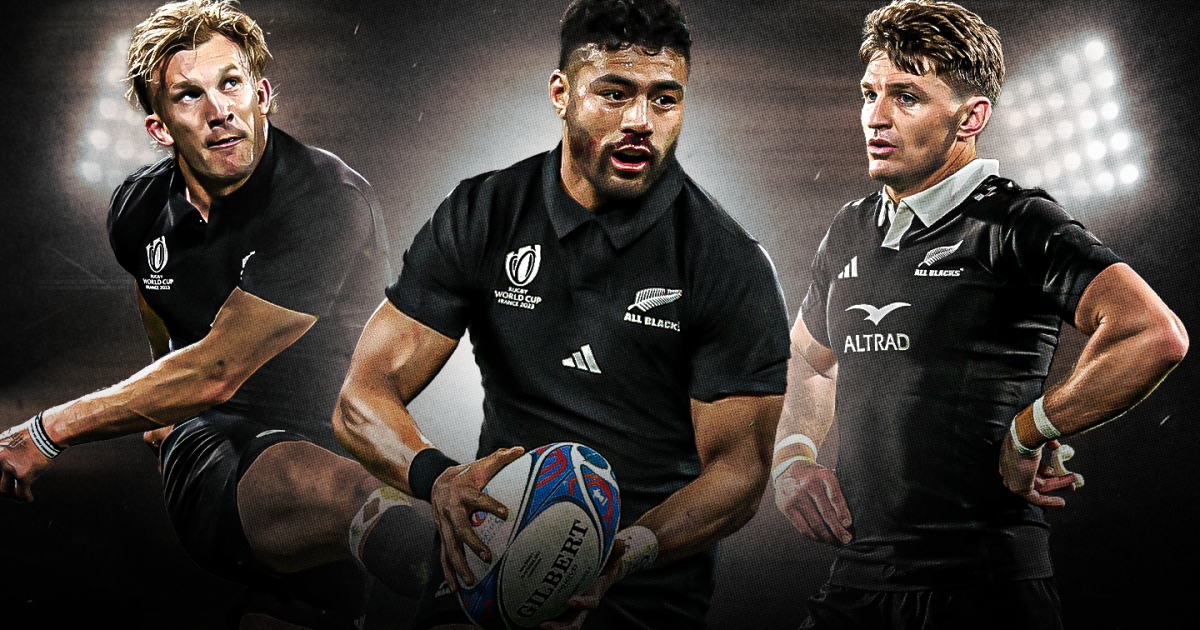At the executive level and certainly within the All Blacks coaching group, the impending return of Richie Mo’unga has been celebrated as a giant win for New Zealand. At New Zealand Rugby headquarters, the decision by Mo’unga to commit to an 18-month contract that will see him come back to New Zealand in the middle of next year after he finishes his commitments with Toshiba Brave Lupus, is being viewed as definitive proof that its eligibility policy working and that the best New Zealanders are happy to forfeit better pay in pursuit of winning Test caps.
Mo’unga, who has reportedly been earning about $2.2m a year in Japan, coming home to earn less than half of that, is certainly strong proof that the All Blacks’ jersey still holds a magnetic pull.
All Blacks head coach Scott Robertson will have another world-class No 10 at his disposal -one with 56 Test caps and two World Cups under his belt – which gives him a missing piece in his 4-4-4 project.
Robertson has stated that by the end of his four-year contract, the All Blacks will need four genuine options in every position if they are to win a fourth World Cup. Fittingly, it was the events of the 2011 World Cup when the All Blacks lost three No 10s to injury – Dan Carter, Colin Slade and Aaron Cruden – and had to play the last 50 minutes of the final with fourth-choice fly-half Stephen Donald, that sparked the 4-4-4 project.
Getting Mo’unga back means the All Blacks will come into 2027 with him, Beauden Barrett and Damian McKenzie, as well as Ruben Love, who will likely have built a portfolio of Test experience by then – some of which will likely be at No 10.
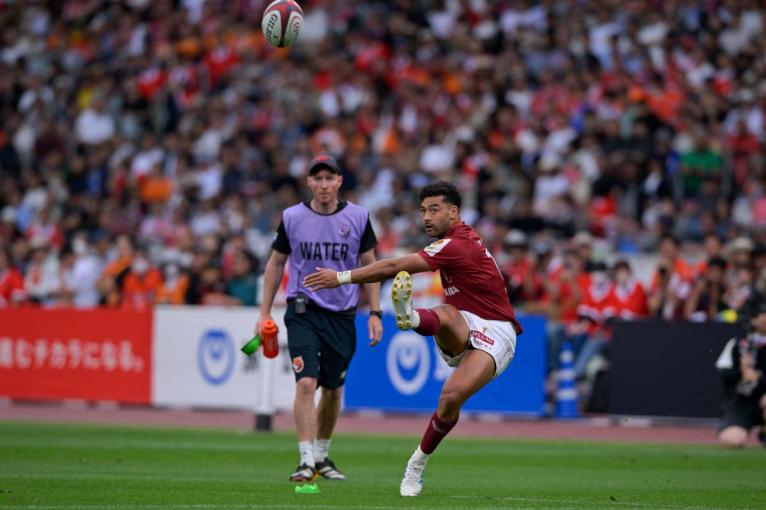 Richie Mo’Unga has been earning a handsome wage in Japan but will return to New Zealand in the search for a World Cup winners medal (Photo Koki Nagahama/Getty Images)
Richie Mo’Unga has been earning a handsome wage in Japan but will return to New Zealand in the search for a World Cup winners medal (Photo Koki Nagahama/Getty Images)
It’s a four-strong line-up and Robertson is understandably feeling good about knowing that he could replace Barrett with Mo’unga, or vice-versa, all the while knowing that in McKenzie, he has a 50-plus caps option in reserve.
“Everyone’s just really, really pleased,” Robertson said about Mo’unga’s decision. “New Zealand rugby is pleased in general that he’s coming back into our game.
“He’s going to be around for a Rugby World Cup. He’s served our country for a long time and he’s going to come back and do it again.
“One thing we’re really proud of is the retention of our players. We’ve got a group of guys who are hugely committed to the All Blacks. It’s great to have another one back.”
But there has to be a significant note of caution struck amid this Lego movie “everything is awesome” narrative, and some critical analysis applied to highlight that this might not be the win-win which it is being portrayed as.
Mo’unga wasn’t willing to commit to NZR for any longer than 18 months. The national body wanted him to sign through to the British and Irish Lions tour in 2029.
Far from being a victory for New Zealand’s eligibility policy, it may have set a dangerous precedent as Mo’unga has been sanctioned to do the very thing NZR says the system is designed to stop happening – which is that he is going to spend three of the four years of this cycle playing offshore, come home for one year, try to play at the World Cup, and then possibly return to Japan.
This scenario happened because Mo’unga wasn’t willing to commit to NZR for any longer than 18 months.
The national body wanted him to sign through to the British and Irish Lions tour in 2029, and if he had, it would have made a concession to fast track his eligibility on his return and be available for the six-week tour of South Africa in August and September next year.
But when he wouldn’t budge, Mo’unga was told that he won’t become eligible – despite coming home in May next year – until the Bledisloe Cup series in October.
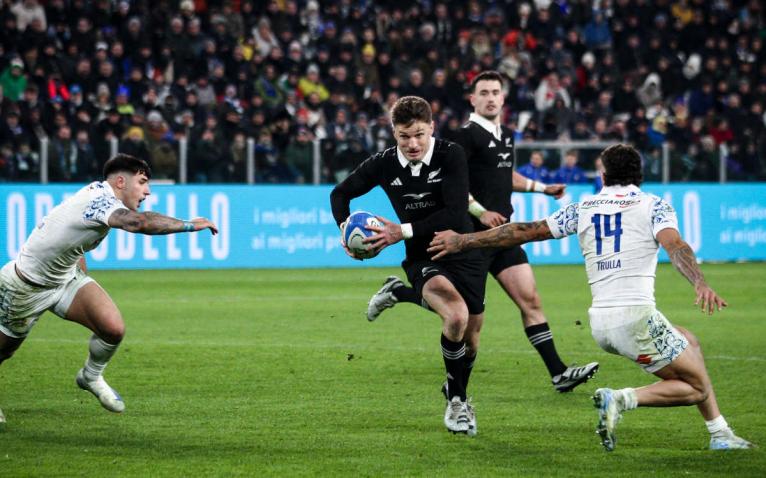 The All Blacks will try to nurse Beauden Barrett to the World Cup in Australia, where he will be 36 (Photo Matteo Bottanelli/NurPhotGetty Images)
The All Blacks will try to nurse Beauden Barrett to the World Cup in Australia, where he will be 36 (Photo Matteo Bottanelli/NurPhotGetty Images)
NZR feels that by only giving Mo’unga a runway of 12 Tests to stake his claim to go to the World Cup, it has protected the interests of Barrett, McKenzie, Love and all the other players who have stayed loyal and been in New Zealand for the whole cycle.
It’s true that Mo’unga’s quest to make it to the World Cup has been made harder by signing a short-term contract, but no one can foresee a scenario where he’s not fast-tracked back into the All Blacks the instant he’s eligible.
He’s going to be picked, because Robertson has never hidden his admiration for Mo’unga or his desire to bring him back to New Zealand.
Last year Robertson went to Japan to start talks to see if Mo’unga and Toshiba could be persuaded to release him from the final year of his three-year contract.
The All Blacks coach also lobbied the NZR board to consider making changes to the eligibility rules to facilitate earlier access to Mo’unga even if he didn’t leave Toshiba a year early.
Concessions made for the most talented and that Mo’unga is a player who can contribute significantly towards the All Blacks achieving their goal of winning the 2027 World Cup.
After all that and given their relationship which stretches back across winning seven successive Super Rugby Championships together at the Crusaders, Robertson hasn’t brought Mo’unga home to not pick him in the All Blacks.
The fact that NZR, when they couldn’t get Mo’unga to sign for three years, offered him an 18-month contract, is another big clue about what is going to happen.
The national body could have walked away, but it is apparent that Robertson made his case to say that it would be mad to not have access to Mo’unga, even if it is only for one year.
Arguably he’s right, and that this is the nature of high-performance sport in the professional world – there are concessions made for the most talented and that Mo’unga is a player who can contribute significantly towards the All Blacks achieving their goal of winning the 2027 World Cup.
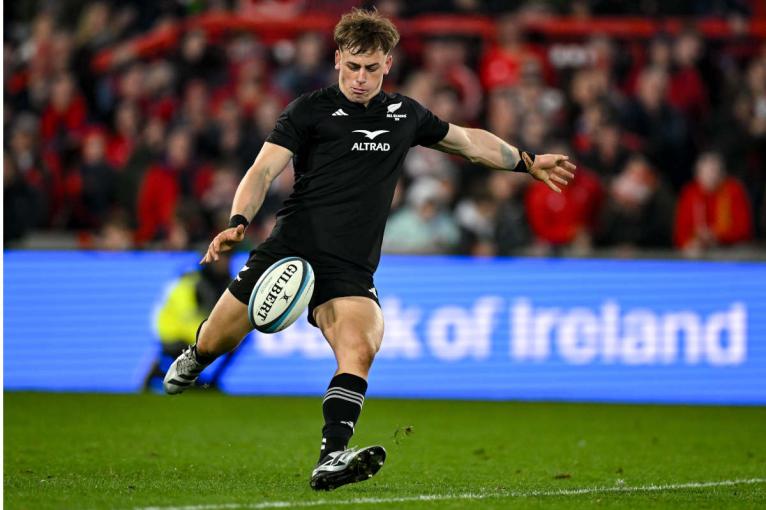 Behind the hugely experience trio of No 10s, Ruben Love is expected to challenge for an All Blacks shirt (Photo Brendan Moran/Getty Images)
Behind the hugely experience trio of No 10s, Ruben Love is expected to challenge for an All Blacks shirt (Photo Brendan Moran/Getty Images)
But there is another reality that says players are human, that team dynamics matter and that there needs to be unshakeable trust and confidence in the coaching group for harmony to reign, and that begs the question of just how Robertson intends to integrate Mo’unga.
Is he going to be used off the bench, deferring to Barrett who has been the preferred fly-half since 2024, or thrown straight into the No 10 jersey given there is limited time for him to acquaint himself with the strategic blueprint?
Mo’unga is a specialist No 10, so if he doesn’t start, his lack of versatility counts against him being on the bench.
And if he becomes the preferred starter, how much of a tactical risk will Robertson be taking to change his preferred starting 10 so close to the World Cup?
Barrett was once again one of the All Blacks best players in the opening Rugby Championship fixture against Argentina, delivering mature game management.
He kept turning the Pumas with his kicking portfolio and given the way he’s facilitating so much of the All Blacks attack and so instrumental in ensuring they are playing in the right areas of the field at the right time, dropping him for Mo’unga late next year would be a high risk call indeed.
Barrett and McKenzie are consummate professionals, but it would be understandable that both, having done all the heavy lifting through 2024 to late 2026, may feel somewhat miffed if they are usurped by Mo’unga in World Cup year.
Barrett and McKenzie are consummate professionals, but it would be understandable that both, having done all the heavy lifting through 2024 to late 2026, may feel somewhat miffed if they are usurped by Mo’unga in World Cup year.
And it’s the potential impact on team dynamics rather that may be the bigger risk in fast-tracking Mo’unga into the team.
Again, this may be the sort of cruel fate that players accept is part and parcel of their cut-throat world, but this scenario has potential to turn toxic much in the same way England’s 2015 World Cup campaign imploded after the coaches got in a mess over Sam Burgess who had converted to rugby from league in October 2014.
All sorts of dramas were triggered by introducing a high-profile player into the mix so late in the piece and a team that was tracking so well on the eve of the tournament, was riddled with anxieties, factions and a loss of confidence once it kicked off.
This doesn’t mean it will be a mistake for Robertson to pick Mo’unga next October, but he has to be conscious of how that will impact the existing group and be clear and consistent with his re-integration plan.
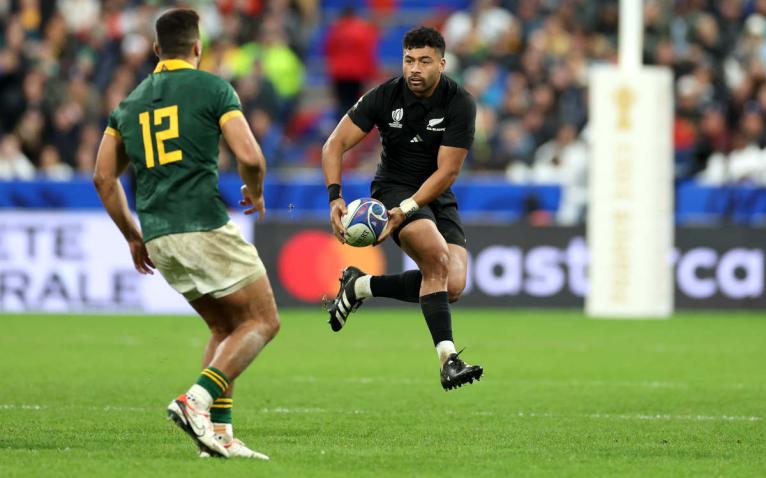 Mo’Unga will be added the All Blacks’ arsenal with the target of stopping the Springboks completing a World Cup three-peat (Photo Chris Hyde/Getty Images)
Mo’Unga will be added the All Blacks’ arsenal with the target of stopping the Springboks completing a World Cup three-peat (Photo Chris Hyde/Getty Images)
As former All Blacks coach Steve Hansen said of Mo’unga: “We know he’s a quality player. He’s won many, many titles and five-eighths [are] your main computer, so he’s obviously doing a good job in the team he’s in.
“He’s had a third and a second at a World Cup, so he’s obviously performed at those levels as well. It adds to the depth with Beauden playing really well, McKenzie playing well and Richie coming back, so yeah, you need depth to be able to win World Cups.
“Both of those young men are great All Blacks and they’re good men who have always put the team first, so they’ll be looking to play well and make it difficult for someone like Richie to get back in the team.
“I wouldn’t think it’s a given that Richie just walks straight back in, I think he has to earn the right just like the other two boys are having to earn the right.”
That comes across as a coded warning to Robertson that he can’t dismiss the importance of managing the egos, ambitions and careers of seasoned internationals such as Barrett and McKenzie who have been loyal to New Zealand for a long time.
But in Robertson’s only public mention of Mo’unga’s return to date, all he has said about Barrett and McKenzie, is: “They’re big boys. They know the game. It’s professional and we’re here to compete. The jersey is bigger than everybody. Everyone knows it’s always earned.”
